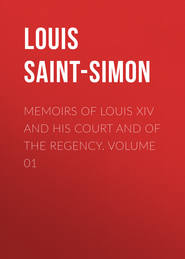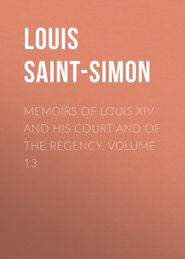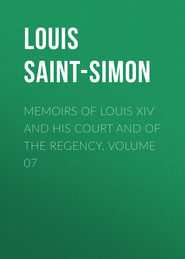По всем вопросам обращайтесь на: info@litportal.ru
(©) 2003-2024.
✖
Memoirs of Louis XIV and His Court and of the Regency. Volume 04
Настройки чтения
Размер шрифта
Высота строк
Поля
The solidity of these reasons persuaded Madame des Ursins to follow the advice given her. She resolved to depart, but not until after a delay by which she meant to profit to the utmost. We shall soon see what success attended her schemes. The terms upon which I stood with her enabled me to have knowledge of all the sentiments that had passed through her mind: her extreme desire, upon arriving in Paris, to return to Spain; the intoxication which seized her in consequence of the treatment she received, and which made her balance this desire; and her final resolution. It was not until afterwards, however, that I learnt all the details I have just related.
It was not long before Madame de Maintenon began to feel impatient at the long-delayed departure of Madame des Ursins. She spoke at last upon the subject, and pressed Madame des Ursins to set out for Spain. This was just what the other wanted. She said that as she had been driven out of Spain like a criminal, she must go back with honour, if Madame de Maintenon wished her to gain the confidence and esteem of the Spaniards. That although she had been treated by the King with every consideration and goodness, many people in Spain were, and would be, ignorant of it, and that, therefore, her return to favour ought to be made known in as public and convincing a manner as was her disgrace. This was said with all that eloquence and persuasiveness for which Madame des Ursins was remarkable. The effect of it exceeded her hopes.
The favours she obtained were prodigious. Twenty thousand livres by way of annual pension, and thirty thousand for her journey. One of her brothers, M. de Noirmoutiers, blind since the age of eighteen or twenty, was made hereditary duke; another, the Abbe de la Tremoille, of exceeding bad life, and much despised in Rome, where he lived, was made cardinal. What a success was this! How many obstacles had to be overcome in order to attain it! Yet this was what Madame des Ursins obtained, so anxious was Madame de Maintenon to get rid of her and to send her to reign in Spain, that she might reign there herself. Pleased and loaded with favour as never subject was before, Madame des Ursins set out towards the middle of July, and was nearly a month on the road. It may be imagined what sort of a reception awaited her in Spain. The King and the Queen went a day's journey out of Madrid to meet her. Here, then, we see again at the height of power this woman, whose fall the King but a short time since had so ardently desired, and whose separation from the King and Queen of Spain he had applauded himself for bringing about with so much tact. What a change in a few months!
The war continued this year, but without bringing any great success to our arms. Villars, at Circk, outmanoeuvred Marlborough in a manner that would have done credit to the greatest general. Marlborough, compelled to change the plan of campaign he had determined on, returned into Flanders, where the Marechal de Villeroy was stationed with his forces. Nothing of importance occurred during the campaign, and the two armies went into winter quarters at the end of October.
I cannot quit Flanders without relating another instance of the pleasant malignity of M. de Lauzun. In marrying a daughter of the Marechal de Lorges, he had hoped, as I have already said, to return into the confidence of the King by means of the Marechal, and so be again entrusted with military command. Finding these hopes frustrated, he thought of another means of reinstating himself in favour. He determined to go to the waters of Aix-la-Chapelle, not, as may be believed, for his health, but in order to ingratiate himself with the important foreigners whom he thought to find there, learn some of the enemy's plans, and come back with an account of them to the King, who would, no doubt, reward him for his zeal. But he was deceived in his calculation. Aix-la-Chapelle, generally so full of foreigners of rank, was this year, owing to the war, almost empty. M. de Lauzun found, therefore, nobody of consequence from whom he could obtain any useful information. Before his return, he visited the Marechal de Villeroy, who received him with all military honours, and conducted him all over the army, pointing out to him the enemy's post; for the two armies were then quite close to each other. His extreme anxiety, however, to get information, and the multitude of his questions, irritated the officers who were ordered to do the honours to him; and, in going about, they actually, at their own risk, exposed him often to be shot or taken. They did not know that his courage was extreme; and were quite taken aback by his calmness, and, his evident readiness to push on even farther than they chose to venture.
On returning to Court, M. de Lauzun was of course pressed by everybody to relate all he knew of the position of the two armies. But he held himself aloof from all questioners, and would not answer. On the day after his arrival he went to pay his court to Monseigneur, who did not like him, but who also was no friend to the Marechal de Villeroy. Monseigneur put many questions to him upon the situation of the two armies, and upon the reasons which had prevented them from engaging each other. M. de Lauzun shirked reply, like a man who wished to be pressed; did not deny that he had well inspected the position of the two armies, but instead of answering Monseigneur, dwelt upon the beauty of our troops, their gaiety at finding themselves so near an enemy, and their eagerness to fight. Pushed at last to the point at which he wished to arrive, "I will tell you, Monseigneur," said he, "since you absolutely command me; I scanned most minutely the front of the two armies to the right and to the left, and all the ground between them. It is true there is no brook, and that I saw; neither are there any ravines, nor hollow roads ascending or descending; but it is true that there were other hindrances which I particularly remarked."
"But what hindrance could there be," said Monseigneur, "since there was nothing between the two armies?"
M. de Lauzun allowed himself to be pressed upon this point, constantly repeating the list of hindrances that did not exist, but keeping silent upon the others. At last, driven into a corner, he took his snuff-box from his pocket.
"You see," said he, to Monseigneur, "there is one thing which much embarrasses the feet, the furze that grows upon the ground, where M. le Marechal de Villeroy is encamped. The furze, it is true, is not mixed with any other plant, either hard or thorny; but it is a high furze, as high, as high, let me see, what shall I say?"—and he looked all around to find some object of comparison—"as high, I assure you, as this snuffbox!"
Monseigneur burst out laughing at this sally, and all the company followed his example, in the midst of which M. de Lauzun turned on his heel and left the room. His joke soon spread all over the Court and the town, and in the evening was told to the King. This was all the thanks M. de Villeroy obtained from M. de Lauzun for the honours he had paid him; and this was M. de Lauzun's consolation for his ill-success at Aix- la-Chapelle.
In Italy our armies were not more successful than elsewhere. From time to time, M. de Vendome attacked some unimportant post, and, having carried it, despatched couriers to the King, magnifying the importance of the exploit. But the fact was, all these successes led to nothing. On one occasion, at Cassano, M. de Vendome was so vigorously attacked by Prince Louis of Baden that, in spite of his contempt and his audacity, he gave himself up for lost. When danger was most imminent, instead of remaining at his post, he retired from the field of battle to a distant country-house, and began to consider how a retreat might be managed. The Grand Prieur, his brother, was in command under him, and was ordered to remain upon the field; but he was more intent upon saving his skin than on obeying orders, and so, at the very outset of the fight, ran away to a country-house hard by. M. de Vendome strangely enough had sat down to eat at the country-house whither he had retired, and was in the midst of his meal when news was brought him that, owing to the prodigies performed by one of his officers, Le Guerchois, the fortunes of the day had changed, and Prince Louis of Baden was retiring. M. Vendome had great difficulty to believe this, but ordered his horse, mounted, and, pushing on, concluded the combat gloriously. He did not fail, of course, to claim all the honours of this victory, which in reality was a barren one; and sent word of his triumph to the King. He dared to say that the loss of the enemy was more than thirteen thousand; and our loss less than three thousand—whereas, the loss was at least equal. This exploit, nevertheless, resounded at the Court and through the town as an advantage the most complete and the most decisive, and due entirely to the vigilance, valour, and capacity of Vendome. Not a word was said of his country-house, or the interrupted meal. These facts were only known after the return of the general officers. As for the Grand Prieur, his poltroonery had been so public, his flight so disgraceful—for he had taken troops with him to protect the country-house in which he sought shelter—that he could not be pardoned. The two brothers quarrelled upon these points, and in the end the Grand Prieur was obliged to give up his command. He retired to his house at Clichy, near Paris; but, tiring of that place, he went to Rome, made the acquaintance there of the Marquise de Richelieu, a wanderer like himself, and passed some time with her at Genoa. Leaving that city, he went to Chalons-sur-Saone, which had been fixed upon as the place of his a exile, and there gave himself up to the debaucheries in which he usually lived. From this time until the Regency we shall see nothing more of him. I shall only add, therefore, that he never went sober to bed during thirty years, but was always carried thither dead drunk: was a liar, swindler, and thief; a rogue to the marrow of his bones, rotted with vile diseases; the most contemptible and yet most dangerous fellow in the world.
One day-I am speaking of a time many years previous to the date of the occurrences just related-one day there was a great hunting party at Saint Germain. The chase was pursued so long, that the King gave up, and returned to Saint Germain. A number of courtiers, among whom was M. de Lauzun, who related this story to me, continued their sport; and just as darkness was coming on, discovered that they had lost their way. After a time, they espied a light, by which they guided their steps, and at length reached the door of a kind of castle. They knocked, they called aloud, they named themselves, and asked for hospitality. It was then between ten and eleven at night, and towards the end of autumn. The door was opened to them. The master of the house came forth. He made them take their boots off, and warm themselves; he put their horses into his stables; and at the same time had a supper prepared for his guests, who stood much in need of it. They did not wait long for the meal; yet when served it proved excellent; the wines served with it, too, were of several kinds, and excellent likewise: as for the master of the house, he was so polite and respectful, yet without being ceremonious or eager,
ETEXT EDITOR'S BOOKMARKS:
His great piety contributed to weaken his mind
Of a politeness that was unendurable
Reproaches rarely succeed in love
Spoil all by asking too much
Teacher lost little, because he had little to lose
There was no end to the outrageous civilities of M. de Coislin











